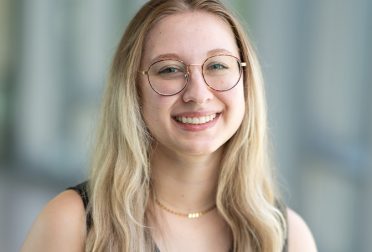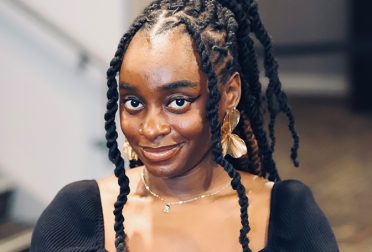Huilin Tu holds a doctorate in materials science and engineering from the University of Illinois at Urbana-Champaign, but she’s excited to earn a master’s of science from SDM as part of the sustainability upskilling program at SLB. She describes herself as a lifelong learner and appreciates that there are many other SDM students who hold PhDs and have more than ten years of work experience. And she’s most looking forward to learning from her fellow students. “I’m so excited to hear from other people who have that sparkle,” she says. “I can talk with them, learn from their unique experience and then be inspired.”
What excites you about meeting your new classmates?
I am a technical person, but I really enjoy connections with people, building meaningful friendships and long term relationships. That’s why I am interested in technology management, where I use my passion for the technical side, but bring ideas together with a team. SDM is a welcoming place for all different perspectives. Our classmates are from drastically different industries, like IT, healthcare, energy, transportation, the defense industry government, or entrepreneurship. It’s also very diverse in terms of culture. I feel when we meet someone who has a different experience, we are exposed to new ideas and different viewpoints, which will trigger us to build new knowledge. In addition, we can make new friendships and connections, and they will be great resources to make our time at SDM more fun and engaging.
What’s something you’re looking forward to learning in the core class?
When I think about what I want to learn, I’m thinking about what problem I want to solve. I am sponsored by our company to earn a master’s degree focusing on sustainability. If we can decarbonize and make our operations more sustainable, then this planet will be in a better place. But climate change is complex and extremely difficult to address, like moving a mountain. Where do we even start? Individually, what is my role to play? And how can I be a force multiplier? In the core classes, I look forward to learning the tools to develop systems-level understandings, and the strategies and techniques to formulate solutions. The core training will help me delve into technical depth and gain bigger picture insights.
How do you think a systems approach will be useful in your work?
In a large organization, there are many units. Without system thinking and coordination, every individual unit tends to make decisions that are the best for themselves, but that decision may be actually harmful for the whole company’s interests. A siloed approach doesn’t optimize the company’s interests in terms of performance, reliability, cost, or carbon footprint. If I step back to a bigger view and understand all the different aspects, it will help me make a system-level decision that may optimize the value and impact for all. And I need to learn how to collaborate among different business units and align the interests of different stakeholders.
What other courses are you looking at beyond the core class?
Energy, Materials and Manufacturing is one of the courses that will help me connect the dots. I have a background in energy and materials, but I haven’t had any formal education in manufacturing. This class will give me a more systematic understanding of energy materials.
Outside of materials, I want to pivot and explore artificial intelligence. I have always been a person who deals with tangible materials and tools. At SDM, I want to challenge myself and learn AI-related topics like data mining and large language models. Even if I am not the person who codes and makes AI tools, I need to be able to understand them to make informed decisions in my future work.
Is there anything else that excites you about joining the program and coming to MIT?
Yes, it feels a bit like a homecoming, because my career started in Cambridge, very close to MIT. I spent five and a half years at the Schlumberger Doll Research Center in Cambridge, one block away from campus. Back then, I had the great pleasure of sitting in on some of the seminars that were open to the public. I got to listen to chemical engineering or materials science seminars and gain knowledge. It was a privilege to hear these famous, Nobel laureate-level speakers. So I’m super excited to be coming back to Cambridge and coming to MIT.




